Throwing of banned items in to prisons more than doubles
- Published
Watch a drone deliver drugs and mobile phones to London prisoners in April 2016
The number of times banned items were thrown in to prisons in England and Wales has more than doubled in the last two years, the BBC has learnt.
More than 2,000 banned items, including drugs and mobile phones, were thrown in to prisons last year.
An information request also showed 730 knives and blades were found in prisons in the last six months of 2015.
The Ministry of Justice said it "must do more" to tackle the smuggling in and throwing over of contraband.
Banned items were thrown over the walls of prisons 2,151 times in 2015, according to figures released by the Ministry of Justice in response to a freedom of information request.
The figure has more than doubled since 2013 when contraband was recorded as having been thrown over 797 times.
John Attard of the Prison Governors' Association said: "It's not a fluke, people plan, they know the best parts of a wall to throw things over.
"There are all sorts of methods to get things over a prison wall. We've had people putting drugs in dead birds and sending them over with tennis racquets.
"We're talking about thousands of pounds worth of contraband but the criminals that are throwing them over are prepared to lose [part of] that to get some through."
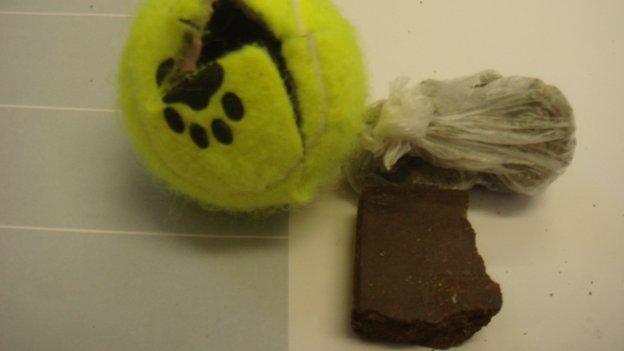
Tennis balls containing drugs have been thrown over prison walls
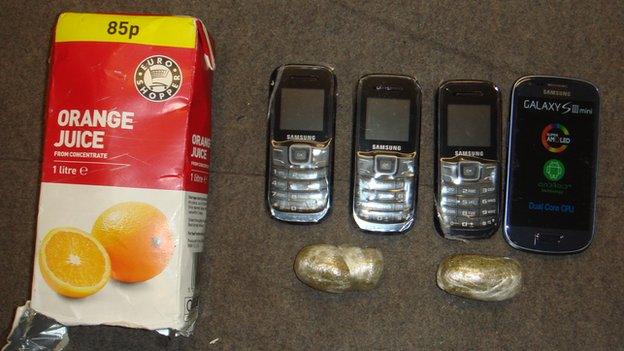
Concealing drugs and mobile phones inside drink cartons is another common way of delivering contraband
Pentonville prison recorded only 15 incidents of banned items being thrown over its walls in the last year. A resident living near the prison said the figure was not a true reflection of the scale of the problem.
"They've missed off a zero there. In the last year alone, I've seen it a good couple of dozen times myself.
"It tallies with the attitude of the prison. They will not hear reports of this going on. They don't want to know.
"It starts off on a Friday, and can happen all weekend. Around two o'clock in the morning is a favourite time. The prisoners will burn holes [in the perimeter netting] to fish out items that have been thrown in."
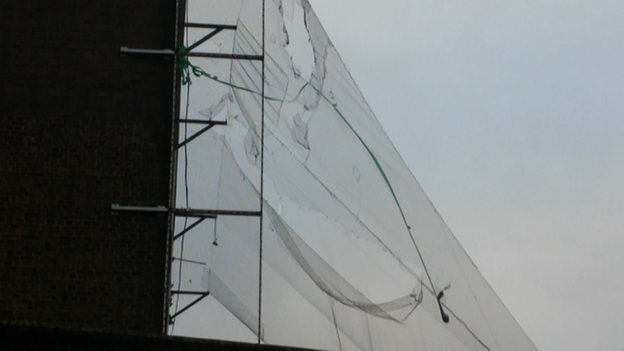
The BBC has obtained footage of goods being pulled over walls in to cells through holes in netting
The resident said items were attached to lines, thrown over the wall and pulled through holes in the netting by inmates.
The BBC spoke to one former prisoner who served five years in a number of prisons and wished to remain anonymous.
He said the method is one of the most popular ways of delivering contraband to inmates.
"They get thrown over the wall. If you go to any prison, walk the circumference of that prison, I guarantee you, you will see things hanging in the wires, there will be a parcel of phones hanging in the razor wire.
"How are you supposed to control it? You can't stop it. There's no way of stopping it if everyone's doing it."
He said drugs are often concealed in innocuous items.
"It can get thrown over the wall in tennis balls. They cut the tennis ball, fill them and throw them over. It's quite a military operation. I've seen it happen, balls flying over, people picking them up and they're going to the correct people."
The BBC has obtained photographs of juice cartons, tennis balls and shampoo bottles containing drugs and mobile phones that have been thrown over prison walls.
The Ministry of Justice said it had recently legislated to make smuggling spice into prison illegal.
"Those caught trying to throw packages over prison walls can now face up to two years in jail.
"However we must do more, which is why we are investing £1.3bn to transform the prison estate, to better support rehabilitation and tackle bullying, violence and drugs."
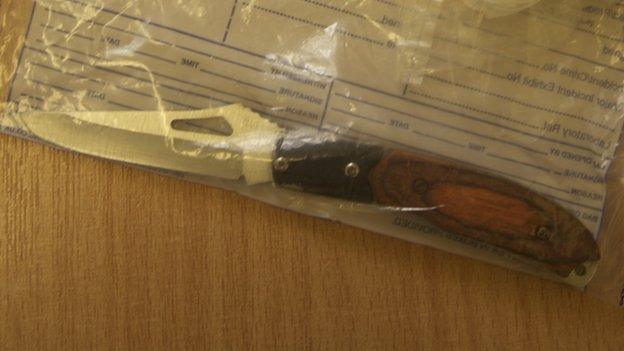
Four knives and blades were found a day in prisons in England and Wales in the last six months of 2015
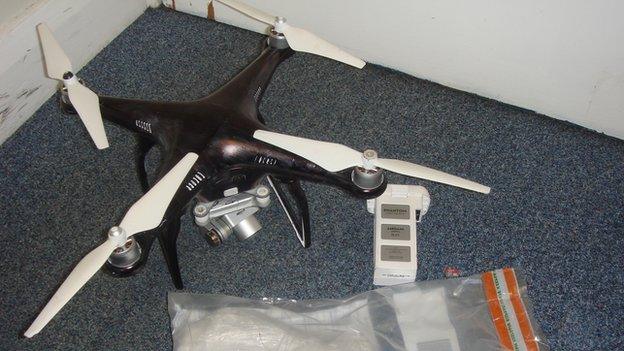
Drones, like this one which crash-landed in a UK prison, are another way of delivering contraband
The BBC has also learnt that more than 1,000 weapons were found in prisons in England and Wales in the last six months of 2015.
An information request to the Ministry of Justice also showed that 730 knives or blades were discovered during that period, equivalent to four a day.
A total of 11 firearms were found in 2015, up from one each in both 2013 and 2014, and nine in 2012. This included four replicas, three toys, two homemade and two real firearms.
It comes as MPs warned that prison safety in England and Wales has "deteriorated further" and urgently needs improving.
Stabvest
The former prisoner said weapons were frequently used in prisons.
"There's hidden shanks and knives. You can make [shanks] out of your toothbrush. You melt your toothbrush with your razorblades. Cos you're working in workshops, it's easy to get a bit of metal back."
"I made a stabvest out of magazines so if anyone came from behind they'd be stabbing my midriff, that's normally where you get stabbed".
Juliet Lyon, director of the Prison Reform Trust, said "it's incredibly damaging to have a prison estate that is no longer safe.
"The whole purpose of the prison estate is to hold people safely and securely and to try and release them less likely to offend than when they arrived.
"If people are in a jail that's awash with weapons or where there's a high degree of self-harm and fear, you're not going to get that rehabilitation."
The Ministry of Justice said it was "committed to cracking down on the supply of weapons and other contraband in our prisons".